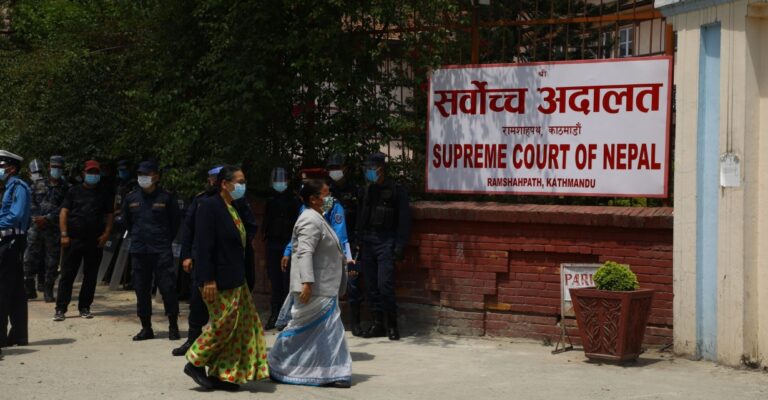
The Supreme Court has issued an interim stay order on implementation of the Nepal Citizenship (First Amendment) Ordinance, 2021.
Stating that no government should issue ordinances for political gain, the five-member Constitutional Bench on Thursday ruled that the issue of making policy provisions on citizenship was important and sensitive, which cannot be addressed through an ordinance.
President Bidya Devi Bhandari, on the recommendation of Prime Minister KP Sharma Oli, had issued the ordinance on May 22, a day after dissolving the House of Representatives with aim of wooing the Mahantha Thakur-Rajendra Mahato faction of the Janata Samajbadi Party-Nepal.
The Thakur- Mahato faction had demanded constitution amendment, release of its jailed cadres and passage of the Citizenship Act, among other things, in exchange of their support Oli.
Though Oli’s CPN-UML had strongly opposed the Madhesi leaders’ demands in the past, Oli later issued the citizenship ordinance for political gains.
“An interim order has been issued in the name of the defendants — Office of the Prime Minister and Council of Ministers and the Office of the President — not to implement the Nepal Citizenship (First Amendment) Ordinance 2021, which was promulgated by the President on May 23, until the final decision,” the court’s order reads.
The ordinance provisioned that the children of Nepali citizens, who received their citizenship before September 20, 2015, would be issued citizenship by descent.
It also said children of Nepali mothers will be entitled to citizenship by descent if their fathers’ whereabouts are unknown.
As many as six petitions were filed challenging the ordinance, arguing that the caretaker government has no authority to issue an ordinance that will have long-term effect.
The Constitutional Bench said that if the ordinance was not endorsed by the Parliament later, problems might arise for those who can obtain citizenship as per the ordinance.
“The court does not deem it necessary to allow implementation of the ordinance now,” the ruling reads.
Stating that the government could issue an ordinance regarding something urgent, the court ruled that issuing an ordinance ‘to accrue political benefits by evading the Parliament can lead to a situation where powers of the Parliament could be unnecessarily infringed upon’.
The court also questioned the government’s intention, saying that issuing the ordinance a day after dissolving the House would be tantamount to “colorable legislation” and interference on constitutional right of Parliament.
The court said that the government failed to give convincing reasons for showing urgency to do something about citizenship issues though the Citizenship (Amendment) Act was under consideration at the Parliament for the past three years.
According to Janata Samajwadi Party-Nepal leader Laxman Lal Karna, about 600,000 Nepali youths have been deprived of citizenship due to lack of clear provisions, leading to them not getting opportunities for employment, foreign travel and education.
He added that stateless youths, despite being legally eligible to hold Nepali citizenship, will continue to suffer because of the court’s stay order.






